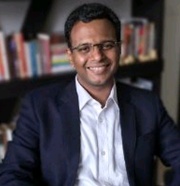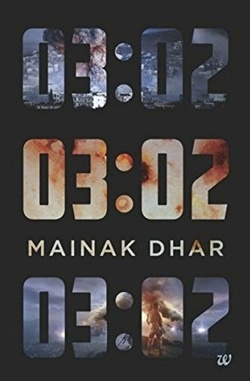Disconnect and be human
08 Jun 2017
 Mainak Dhar has spent two decades in the corporate sector, starting with Procter & Gamble. After spending 15 years outside India across the Asia-Pacific region. He returned to India in 2014 as the managing director of branded food products maker General Mills. A self-described cubical dweller by day and writer at night, Dhar is the author of over a dozen books, some of which have been on the bestsellers list in India and abroad. His books have been translated into Turkish, Vietnamese, Japanese, French, German and Portuguese.
Mainak Dhar has spent two decades in the corporate sector, starting with Procter & Gamble. After spending 15 years outside India across the Asia-Pacific region. He returned to India in 2014 as the managing director of branded food products maker General Mills. A self-described cubical dweller by day and writer at night, Dhar is the author of over a dozen books, some of which have been on the bestsellers list in India and abroad. His books have been translated into Turkish, Vietnamese, Japanese, French, German and Portuguese.
In this interview with Swetha Amit, he talks about his new book 03:02, leadership, terrorism and the ability to deal with unforeseen circumstances.
03:02 is a one of its kind book, which deals with an outage issue and terrorism. What led you to this plot the book?
There were two inspirations. One was from a broader perspective and another from a personal one. From the broader perspective, I realize that we live in a world where bad things happen almost every day. We hear and read about crimes and terror attacks. It makes me wonder about the way we deal with such catastrophes and I then realized how technology comes into play.
A lot of people deal with mishaps in a precarious manner by changing their profile picture to an Indian flag in order to show support. They tend to act like backseat drivers making statements about how the defence could have been better, etc. However, they have the luxury of getting back to their normal lives by logging out of social media as they feel such tragedies are someone else's problem after all. I often wondered what would happen when one does not have the option of logging out and is caught in the midst of unpleasant situations.
Coming to the personal inspiration, whenever I would hear about some mishap, I wondered what we could do as people to tackle such a scenario. There was once a generation who did that. They would take the bull by its horns and rise to the occasion. My grandfather for instance was a freedom fighter. Along with him, there were several others who fought as well. From the stories I would hear, it was not always about picking up the gun and fighting. I felt we had to move out of our social media bit, find a way on how to take a stand and help those around us.
What made you choose the upper crust locality of Powai in Mumbai as the background theme for your book?
There were two reasons. Firstly, I believe that every writer writes best on what he / she knows about. Personally, for me, I like setting my books in the backdrop of places where I have lived earlier. That injects a lot more realism and conviction for the readers. I am also a visual writer and if I can imagine the scenes playing out, it makes the entire writing process fun. Being a Powai resident helped me do that.
Another reason why I chose Powai is that the setting is that of a self-contained community. This area has plenty of good restaurants, shops and schools. However being self-contained can lead to its own dynamics where if you are cut off from the outside world, it leaves you feeling clueless. That's what 03:02 is all about.
There is an interesting line in your book: ''We had taken our modern amenities and life so much for granted that it was hard to contemplate even the most basic things without them.'' Do you think we have become over reliant on technology for our material comforts, especially over the last decade?
Absolutely. I am personally a fan of technology and gadgets. However every tool has its positives and negatives. For instance my son is growing up in a world where he has much more exposure, knowledge and opportunities and is clued on to what's happening in the outside world.
The negative aspect lies in the fact that we tend to miss out on making personal connections. We may have a 1,000+ connections on social media but how many of them can we term as 'friends?' What happened to the good old definition of a friend - one whom you could confide in and one who knows you better than you know yourself? I feel that all of us can disconnect more from technology and connect more with people and communities around us. One of the themes that I picked up in my book was how we could get more involved and make a positive difference around us.
Your book imparts certain aspects of leadership and instances on how to tackle emergencies. One pertinent line in the book is: "leadership is not about position or power, it's the ability to sacrifice yourself for others." As an experienced corporate leader, what is your take on this?
I think the biggest test for a leader is how they deal with failure. Bad leaders push failure downwards and good leaders take accountability for any failure in the business or organisation. The best leaders are those who do not think about their own careers or promotions. They live with the motto that the success of people is their success as well. The worst leaders are those who point fingers and often sacrifice people to save their own skin.
 | |
| Publisher: Westland books / Price: Rs 295 |
Coming back to 03:02, your book depicts the extremes of terrorism, slaughter and mayhem. Considering the alarming increase in terror activities around the world, what do you think can be done to curb terror before it engulfs the world?
Yes, we are seeing a lot of terror. There is always going to be a group of people whose disaffection guides their personalities. It becomes dangerous when such people are able to channel it to their own desires, going to the extent of manipulating young minds to fulfil their mission.
As citizens what each of us can do is start by being more aware and alert. For instance, a few months ago, my family and I were at a mall. We saw this huge plastic bag on the side just lying there. We reported it to the security who immediately notified the police. Ultimately it turned out to be nothing. However, if we can be more involved and report anything suspicious, that would be a start.
Nowadays authorities do take citizens seriously after all that has happened. In fact, that's one of the positives of social media as each one of us has a share of voice. These things bring us together. For instance a girl from our neighbourhood went missing. All of us came out rallying and spreading the message. Ultimately she was found. So, that's what we should do. If we see something amiss, we can always tweet it to the police who are quite responsive on social media. It's also important for all of us to possess some basic skills like first aid to tackle emergencies as not all the time will be able to get the police or army on time.
Your book also talks about dealing with sudden, unforeseen situations and tackling emergencies. In your corporate tenure has there been such a situation that you were confronted with?
Well, the corporate tenure, thankfully, is not as exciting as the events portrayed in 03:02. However, what I think happens is that the corporate world is thrown into ambiguous situations. Sometimes, it's not clear as to who should take accountability or ownership. There are certain crisis situations, which tend to crop up in businesses. Some will wait to see who steps in as there will be some one who will step right up and take the reins. Now that, I believe, is a critical facet of a strong leader. A strong leader is not always appointed but eventually steps forward automatically to tackle the situation.
Any more books in the pipeline? What can we expect from Mainak Dhar next?
I will keep writing. Something in a similar genre. I love thrillers and so it will be on similar lines. I have already started bouncing off some ideas and working on a few drafts.
Lastly, what are your favourite books and is there any particular author who inspired you?
The first writer who inspired me was Tolkien. I read Lord of the Rings, when I was 10 - 11 years old. He has created not just a book but an entire universe altogether. Another author is Roald Dahl who, with his fertile imagination, manages to transport readers into another world. The third author who inspires me greatly is Stephen King. He has the ability to write about varied subjects and takes you through a gamut of emotions. His collection of short stories titled Nightmares & Dreamscapes is my favourite.
(See book excerpt: Excerpt from 03:02)

















